Social and Emotional Development || Assignment
VerifiedAdded on 2022/08/12
|6
|1447
|31
AI Summary
Contribute Materials
Your contribution can guide someone’s learning journey. Share your
documents today.
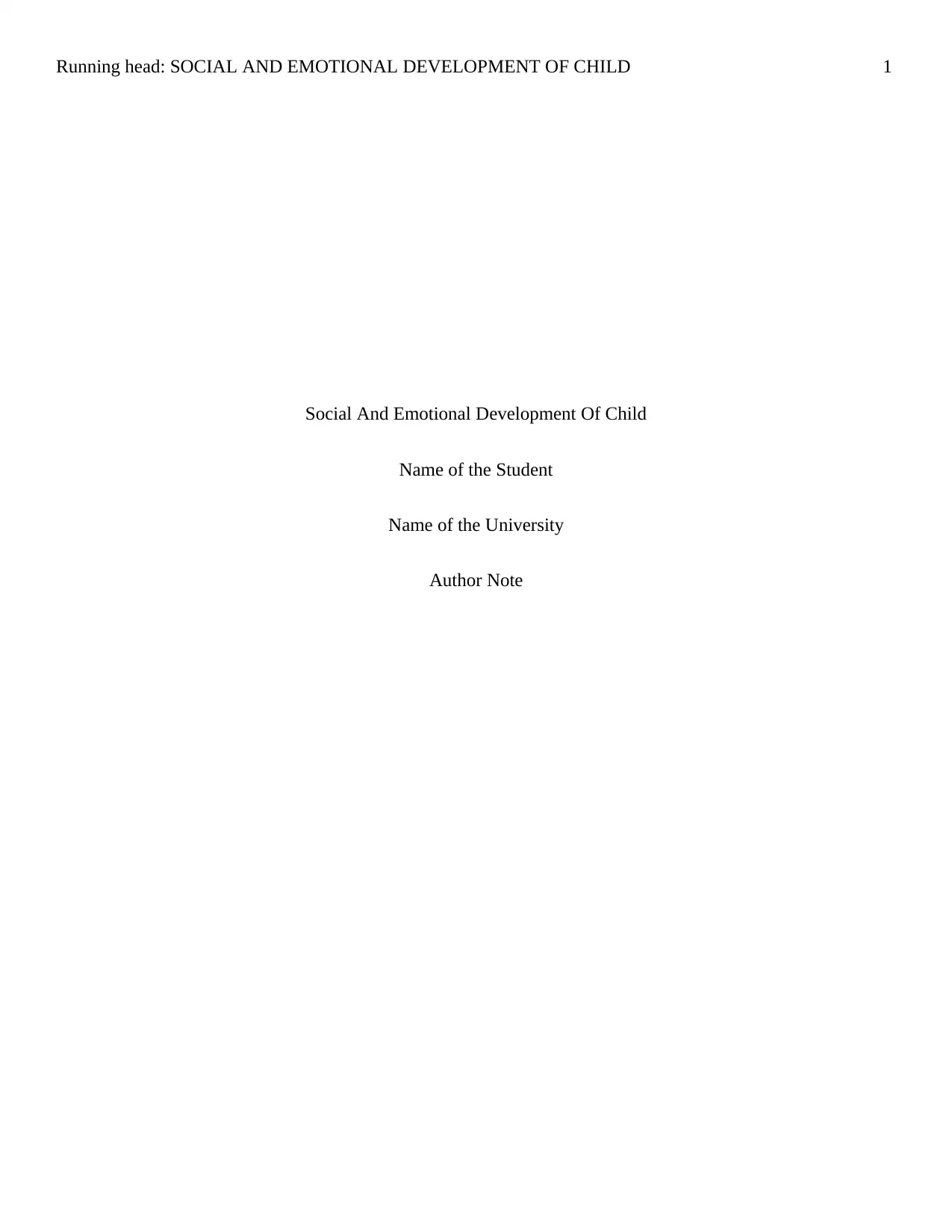
Running head: SOCIAL AND EMOTIONAL DEVELOPMENT OF CHILD 1
Social And Emotional Development Of Child
Name of the Student
Name of the University
Author Note
Social And Emotional Development Of Child
Name of the Student
Name of the University
Author Note
Secure Best Marks with AI Grader
Need help grading? Try our AI Grader for instant feedback on your assignments.
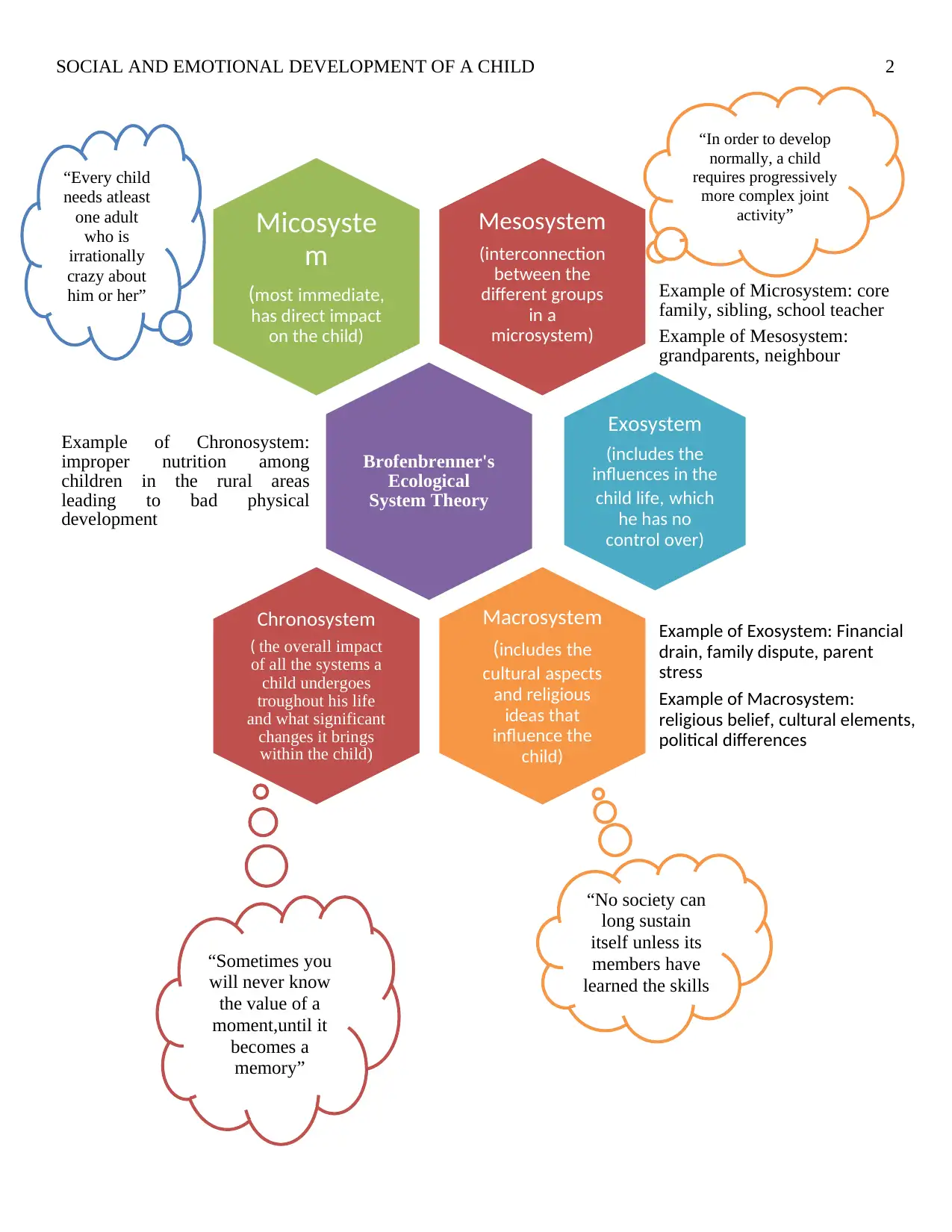
SOCIAL AND EMOTIONAL DEVELOPMENT OF A CHILD 2
Mesosystem
(interconnection
between the
different groups
in a
microsystem)
Example of Microsystem: core
family, sibling, school teacher
Example of Mesosystem:
grandparents, neighbour
Micosyste
m
( most immediate,
has direct impact
on the child)
Brofenbrenner's
Ecological
System Theory
Example of Chronosystem:
improper nutrition among
children in the rural areas
leading to bad physical
development
Exosystem
(includes the
influences in the
child life, which
he has no
control over)
Macrosystem
( includes the
cultural aspects
and religious
ideas that
influence the
child)
Example of Exosystem: Financial
drain, family dispute, parent
stress
Example of Macrosystem:
religious belief, cultural elements,
political differences
Chronosystem
( the overall impact
of all the systems a
child undergoes
troughout his life
and what significant
changes it brings
within the child)
“In order to develop
normally, a child
requires progressively
more complex joint
activity”
“Every child
needs atleast
one adult
who is
irrationally
crazy about
him or her”
“No society can
long sustain
itself unless its
members have
learned the skills
involved in
“Sometimes you
will never know
the value of a
moment,until it
becomes a
memory”
Mesosystem
(interconnection
between the
different groups
in a
microsystem)
Example of Microsystem: core
family, sibling, school teacher
Example of Mesosystem:
grandparents, neighbour
Micosyste
m
( most immediate,
has direct impact
on the child)
Brofenbrenner's
Ecological
System Theory
Example of Chronosystem:
improper nutrition among
children in the rural areas
leading to bad physical
development
Exosystem
(includes the
influences in the
child life, which
he has no
control over)
Macrosystem
( includes the
cultural aspects
and religious
ideas that
influence the
child)
Example of Exosystem: Financial
drain, family dispute, parent
stress
Example of Macrosystem:
religious belief, cultural elements,
political differences
Chronosystem
( the overall impact
of all the systems a
child undergoes
troughout his life
and what significant
changes it brings
within the child)
“In order to develop
normally, a child
requires progressively
more complex joint
activity”
“Every child
needs atleast
one adult
who is
irrationally
crazy about
him or her”
“No society can
long sustain
itself unless its
members have
learned the skills
involved in
“Sometimes you
will never know
the value of a
moment,until it
becomes a
memory”
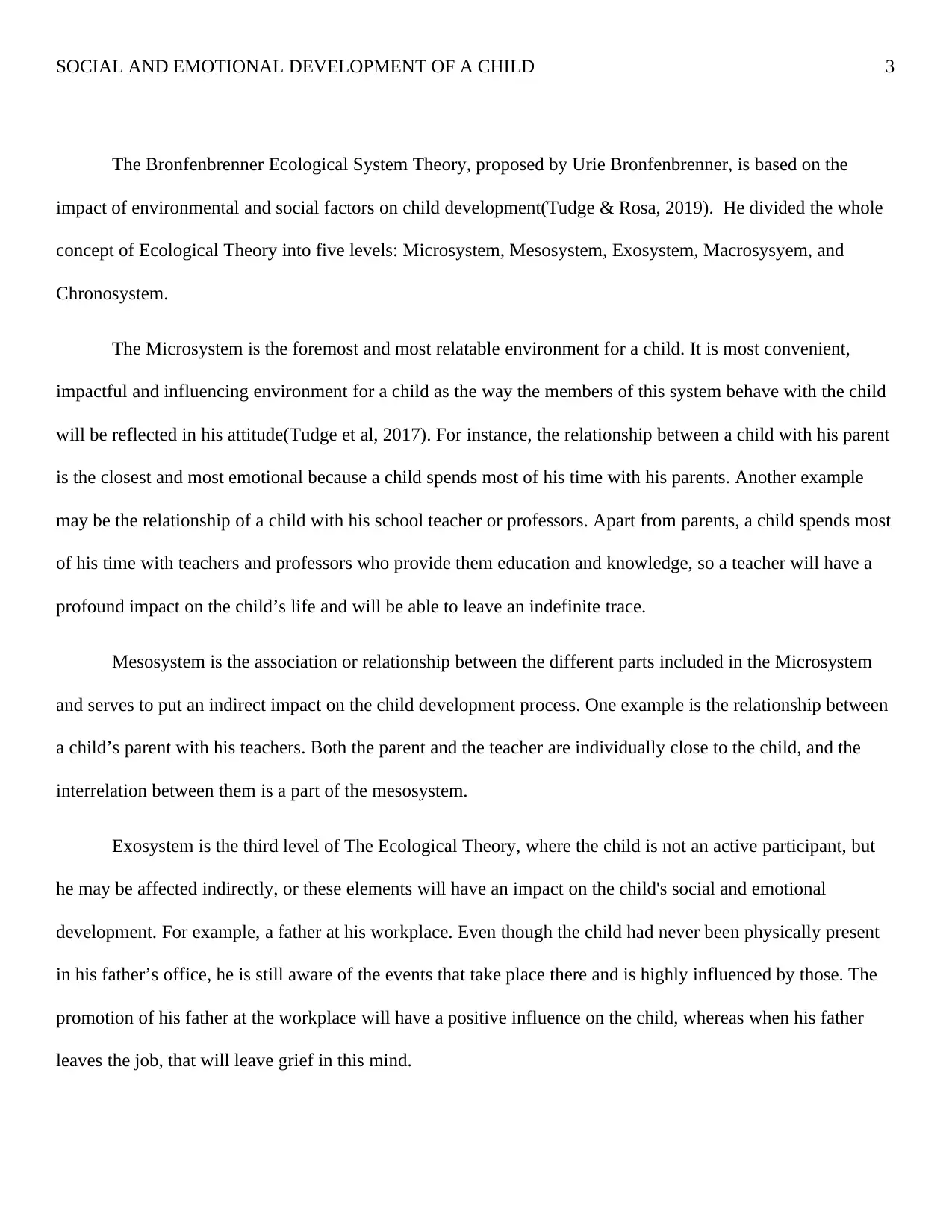
SOCIAL AND EMOTIONAL DEVELOPMENT OF A CHILD 3
The Bronfenbrenner Ecological System Theory, proposed by Urie Bronfenbrenner, is based on the
impact of environmental and social factors on child development(Tudge & Rosa, 2019). He divided the whole
concept of Ecological Theory into five levels: Microsystem, Mesosystem, Exosystem, Macrosysyem, and
Chronosystem.
The Microsystem is the foremost and most relatable environment for a child. It is most convenient,
impactful and influencing environment for a child as the way the members of this system behave with the child
will be reflected in his attitude(Tudge et al, 2017). For instance, the relationship between a child with his parent
is the closest and most emotional because a child spends most of his time with his parents. Another example
may be the relationship of a child with his school teacher or professors. Apart from parents, a child spends most
of his time with teachers and professors who provide them education and knowledge, so a teacher will have a
profound impact on the child’s life and will be able to leave an indefinite trace.
Mesosystem is the association or relationship between the different parts included in the Microsystem
and serves to put an indirect impact on the child development process. One example is the relationship between
a child’s parent with his teachers. Both the parent and the teacher are individually close to the child, and the
interrelation between them is a part of the mesosystem.
Exosystem is the third level of The Ecological Theory, where the child is not an active participant, but
he may be affected indirectly, or these elements will have an impact on the child's social and emotional
development. For example, a father at his workplace. Even though the child had never been physically present
in his father’s office, he is still aware of the events that take place there and is highly influenced by those. The
promotion of his father at the workplace will have a positive influence on the child, whereas when his father
leaves the job, that will leave grief in this mind.
The Bronfenbrenner Ecological System Theory, proposed by Urie Bronfenbrenner, is based on the
impact of environmental and social factors on child development(Tudge & Rosa, 2019). He divided the whole
concept of Ecological Theory into five levels: Microsystem, Mesosystem, Exosystem, Macrosysyem, and
Chronosystem.
The Microsystem is the foremost and most relatable environment for a child. It is most convenient,
impactful and influencing environment for a child as the way the members of this system behave with the child
will be reflected in his attitude(Tudge et al, 2017). For instance, the relationship between a child with his parent
is the closest and most emotional because a child spends most of his time with his parents. Another example
may be the relationship of a child with his school teacher or professors. Apart from parents, a child spends most
of his time with teachers and professors who provide them education and knowledge, so a teacher will have a
profound impact on the child’s life and will be able to leave an indefinite trace.
Mesosystem is the association or relationship between the different parts included in the Microsystem
and serves to put an indirect impact on the child development process. One example is the relationship between
a child’s parent with his teachers. Both the parent and the teacher are individually close to the child, and the
interrelation between them is a part of the mesosystem.
Exosystem is the third level of The Ecological Theory, where the child is not an active participant, but
he may be affected indirectly, or these elements will have an impact on the child's social and emotional
development. For example, a father at his workplace. Even though the child had never been physically present
in his father’s office, he is still aware of the events that take place there and is highly influenced by those. The
promotion of his father at the workplace will have a positive influence on the child, whereas when his father
leaves the job, that will leave grief in this mind.
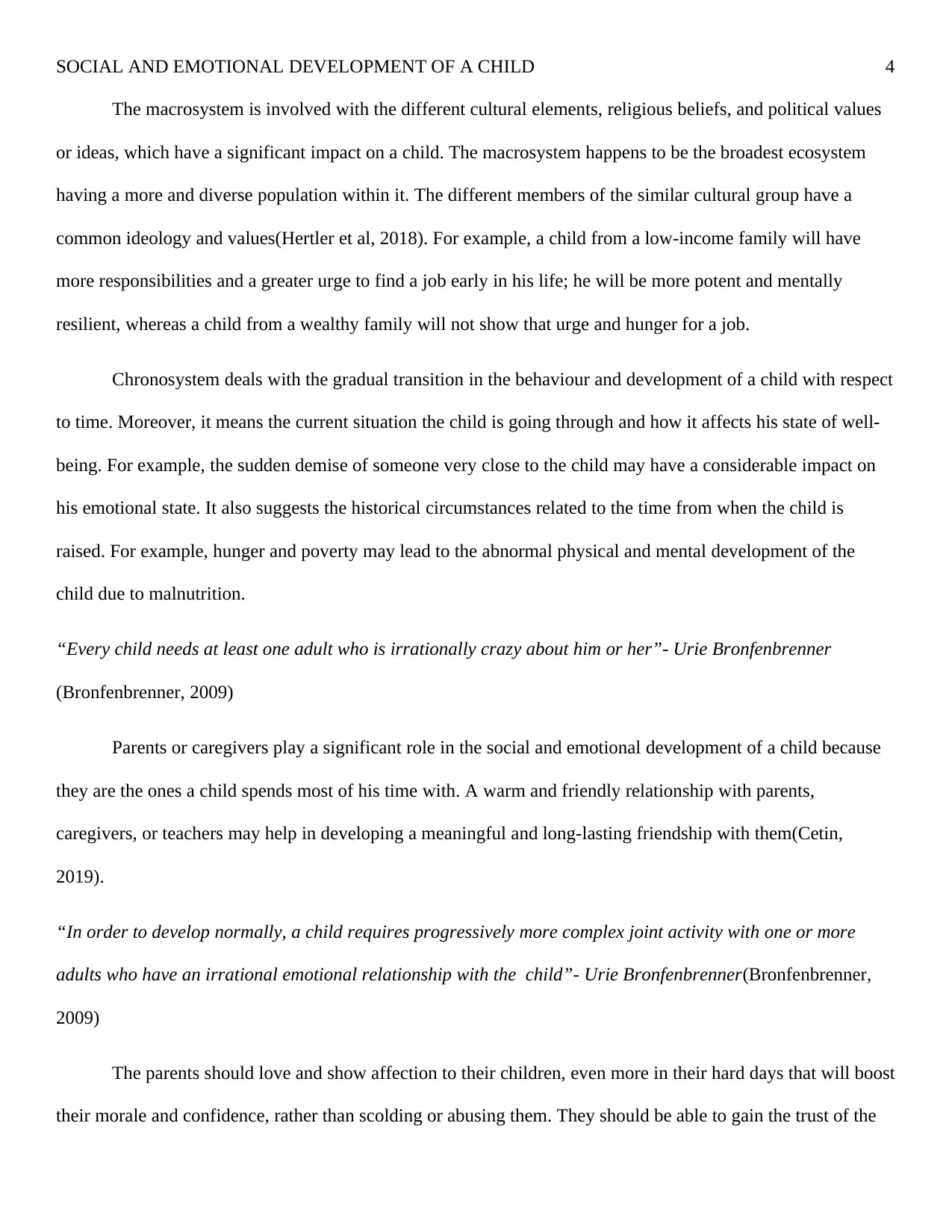
SOCIAL AND EMOTIONAL DEVELOPMENT OF A CHILD 4
The macrosystem is involved with the different cultural elements, religious beliefs, and political values
or ideas, which have a significant impact on a child. The macrosystem happens to be the broadest ecosystem
having a more and diverse population within it. The different members of the similar cultural group have a
common ideology and values(Hertler et al, 2018). For example, a child from a low-income family will have
more responsibilities and a greater urge to find a job early in his life; he will be more potent and mentally
resilient, whereas a child from a wealthy family will not show that urge and hunger for a job.
Chronosystem deals with the gradual transition in the behaviour and development of a child with respect
to time. Moreover, it means the current situation the child is going through and how it affects his state of well-
being. For example, the sudden demise of someone very close to the child may have a considerable impact on
his emotional state. It also suggests the historical circumstances related to the time from when the child is
raised. For example, hunger and poverty may lead to the abnormal physical and mental development of the
child due to malnutrition.
“Every child needs at least one adult who is irrationally crazy about him or her”- Urie Bronfenbrenner
(Bronfenbrenner, 2009)
Parents or caregivers play a significant role in the social and emotional development of a child because
they are the ones a child spends most of his time with. A warm and friendly relationship with parents,
caregivers, or teachers may help in developing a meaningful and long-lasting friendship with them(Cetin,
2019).
“In order to develop normally, a child requires progressively more complex joint activity with one or more
adults who have an irrational emotional relationship with the child”- Urie Bronfenbrenner(Bronfenbrenner,
2009)
The parents should love and show affection to their children, even more in their hard days that will boost
their morale and confidence, rather than scolding or abusing them. They should be able to gain the trust of the
The macrosystem is involved with the different cultural elements, religious beliefs, and political values
or ideas, which have a significant impact on a child. The macrosystem happens to be the broadest ecosystem
having a more and diverse population within it. The different members of the similar cultural group have a
common ideology and values(Hertler et al, 2018). For example, a child from a low-income family will have
more responsibilities and a greater urge to find a job early in his life; he will be more potent and mentally
resilient, whereas a child from a wealthy family will not show that urge and hunger for a job.
Chronosystem deals with the gradual transition in the behaviour and development of a child with respect
to time. Moreover, it means the current situation the child is going through and how it affects his state of well-
being. For example, the sudden demise of someone very close to the child may have a considerable impact on
his emotional state. It also suggests the historical circumstances related to the time from when the child is
raised. For example, hunger and poverty may lead to the abnormal physical and mental development of the
child due to malnutrition.
“Every child needs at least one adult who is irrationally crazy about him or her”- Urie Bronfenbrenner
(Bronfenbrenner, 2009)
Parents or caregivers play a significant role in the social and emotional development of a child because
they are the ones a child spends most of his time with. A warm and friendly relationship with parents,
caregivers, or teachers may help in developing a meaningful and long-lasting friendship with them(Cetin,
2019).
“In order to develop normally, a child requires progressively more complex joint activity with one or more
adults who have an irrational emotional relationship with the child”- Urie Bronfenbrenner(Bronfenbrenner,
2009)
The parents should love and show affection to their children, even more in their hard days that will boost
their morale and confidence, rather than scolding or abusing them. They should be able to gain the trust of the
Secure Best Marks with AI Grader
Need help grading? Try our AI Grader for instant feedback on your assignments.
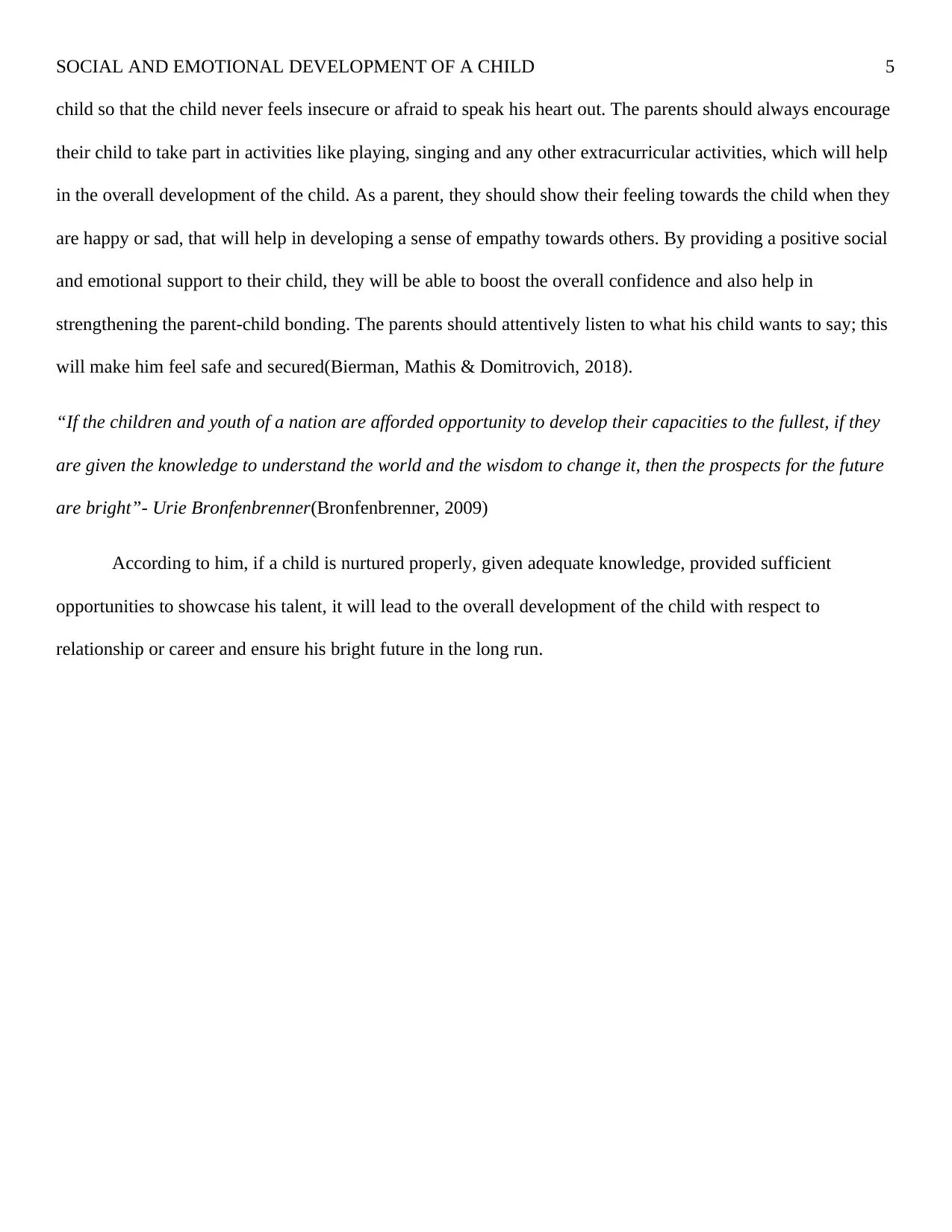
SOCIAL AND EMOTIONAL DEVELOPMENT OF A CHILD 5
child so that the child never feels insecure or afraid to speak his heart out. The parents should always encourage
their child to take part in activities like playing, singing and any other extracurricular activities, which will help
in the overall development of the child. As a parent, they should show their feeling towards the child when they
are happy or sad, that will help in developing a sense of empathy towards others. By providing a positive social
and emotional support to their child, they will be able to boost the overall confidence and also help in
strengthening the parent-child bonding. The parents should attentively listen to what his child wants to say; this
will make him feel safe and secured(Bierman, Mathis & Domitrovich, 2018).
“If the children and youth of a nation are afforded opportunity to develop their capacities to the fullest, if they
are given the knowledge to understand the world and the wisdom to change it, then the prospects for the future
are bright”- Urie Bronfenbrenner(Bronfenbrenner, 2009)
According to him, if a child is nurtured properly, given adequate knowledge, provided sufficient
opportunities to showcase his talent, it will lead to the overall development of the child with respect to
relationship or career and ensure his bright future in the long run.
child so that the child never feels insecure or afraid to speak his heart out. The parents should always encourage
their child to take part in activities like playing, singing and any other extracurricular activities, which will help
in the overall development of the child. As a parent, they should show their feeling towards the child when they
are happy or sad, that will help in developing a sense of empathy towards others. By providing a positive social
and emotional support to their child, they will be able to boost the overall confidence and also help in
strengthening the parent-child bonding. The parents should attentively listen to what his child wants to say; this
will make him feel safe and secured(Bierman, Mathis & Domitrovich, 2018).
“If the children and youth of a nation are afforded opportunity to develop their capacities to the fullest, if they
are given the knowledge to understand the world and the wisdom to change it, then the prospects for the future
are bright”- Urie Bronfenbrenner(Bronfenbrenner, 2009)
According to him, if a child is nurtured properly, given adequate knowledge, provided sufficient
opportunities to showcase his talent, it will lead to the overall development of the child with respect to
relationship or career and ensure his bright future in the long run.
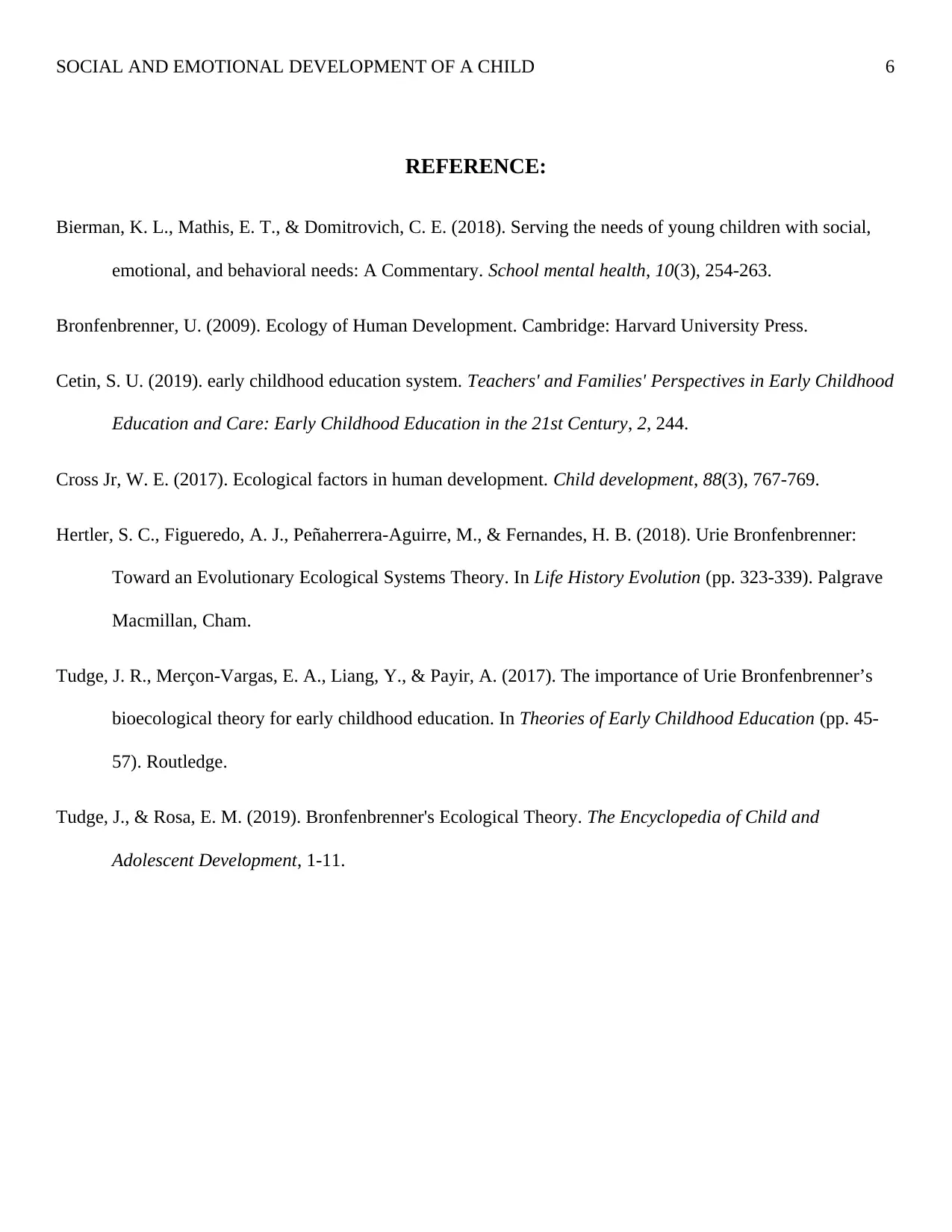
SOCIAL AND EMOTIONAL DEVELOPMENT OF A CHILD 6
REFERENCE:
Bierman, K. L., Mathis, E. T., & Domitrovich, C. E. (2018). Serving the needs of young children with social,
emotional, and behavioral needs: A Commentary. School mental health, 10(3), 254-263.
Bronfenbrenner, U. (2009). Ecology of Human Development. Cambridge: Harvard University Press.
Cetin, S. U. (2019). early childhood education system. Teachers' and Families' Perspectives in Early Childhood
Education and Care: Early Childhood Education in the 21st Century, 2, 244.
Cross Jr, W. E. (2017). Ecological factors in human development. Child development, 88(3), 767-769.
Hertler, S. C., Figueredo, A. J., Peñaherrera-Aguirre, M., & Fernandes, H. B. (2018). Urie Bronfenbrenner:
Toward an Evolutionary Ecological Systems Theory. In Life History Evolution (pp. 323-339). Palgrave
Macmillan, Cham.
Tudge, J. R., Merçon-Vargas, E. A., Liang, Y., & Payir, A. (2017). The importance of Urie Bronfenbrenner’s
bioecological theory for early childhood education. In Theories of Early Childhood Education (pp. 45-
57). Routledge.
Tudge, J., & Rosa, E. M. (2019). Bronfenbrenner's Ecological Theory. The Encyclopedia of Child and
Adolescent Development, 1-11.
REFERENCE:
Bierman, K. L., Mathis, E. T., & Domitrovich, C. E. (2018). Serving the needs of young children with social,
emotional, and behavioral needs: A Commentary. School mental health, 10(3), 254-263.
Bronfenbrenner, U. (2009). Ecology of Human Development. Cambridge: Harvard University Press.
Cetin, S. U. (2019). early childhood education system. Teachers' and Families' Perspectives in Early Childhood
Education and Care: Early Childhood Education in the 21st Century, 2, 244.
Cross Jr, W. E. (2017). Ecological factors in human development. Child development, 88(3), 767-769.
Hertler, S. C., Figueredo, A. J., Peñaherrera-Aguirre, M., & Fernandes, H. B. (2018). Urie Bronfenbrenner:
Toward an Evolutionary Ecological Systems Theory. In Life History Evolution (pp. 323-339). Palgrave
Macmillan, Cham.
Tudge, J. R., Merçon-Vargas, E. A., Liang, Y., & Payir, A. (2017). The importance of Urie Bronfenbrenner’s
bioecological theory for early childhood education. In Theories of Early Childhood Education (pp. 45-
57). Routledge.
Tudge, J., & Rosa, E. M. (2019). Bronfenbrenner's Ecological Theory. The Encyclopedia of Child and
Adolescent Development, 1-11.
1 out of 6
Related Documents
Your All-in-One AI-Powered Toolkit for Academic Success.
+13062052269
info@desklib.com
Available 24*7 on WhatsApp / Email
![[object Object]](/_next/static/media/star-bottom.7253800d.svg)
Unlock your academic potential
© 2024 | Zucol Services PVT LTD | All rights reserved.





